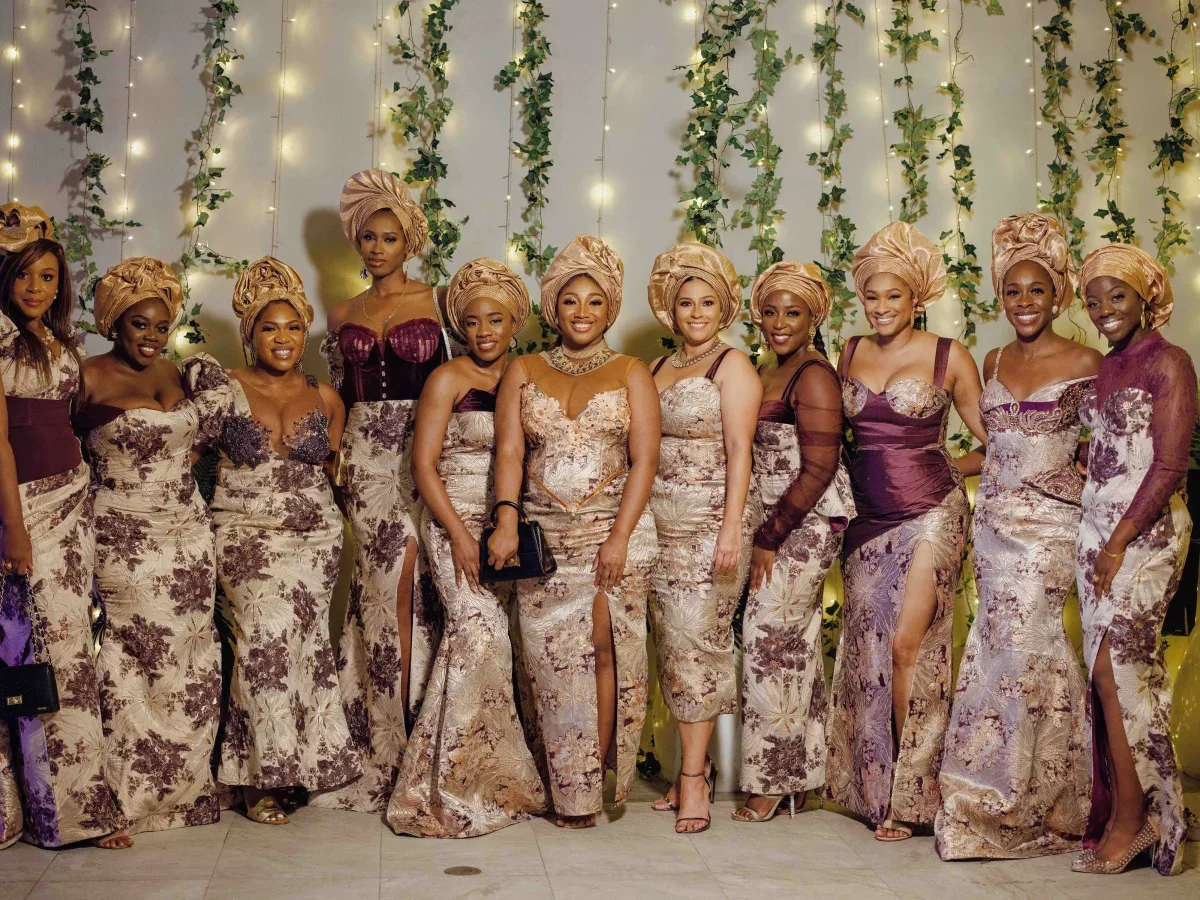
Lush tropical leaves adorned the walls to the entrance of an event venue in Lagos, Nigeria, while drums were played in the background. The perfumed aromas of men and women alike who traveled from near and far, filled the air. The staff spooned out plates of grilled chicken, baked salmon, amala and jollof rice, topping off cups of palm wine as guests settled into their seats for the extravaganza set to unfold. It was the traditional wedding ceremony of my friends Eche and Chika, and I was beaming at the chance to be a part of it.
Hailing originally from the tropical isle of Jamaica, my young immigrant parents traveled with me at 18 months to North America, where I grew up on the margins of many cultures. As a teen and young adult, I weaved throughout spaces with people who did not look like me. From the arts high school I went to where I, the only Black girl in the program, majored in classical music, to the professional circles I found myself in, I’ve had the interesting experience of creating and cultivating “home” within myself despite my occasionally isolating surroundings.
Fast forward to today, where I consciously made a decision to move across the world and live between London and Accra, Ghana working as an investment consultant and I find myself immersed in communities where the majority of the population looks like me. My clients invest in dynamic startups across emerging markets, and I have the unique privilege to travel and activate global opportunities for underrepresented founders in the “developing” world, many of which are based on the continent.
As a Black diaspora woman, learning and understanding the nuances and differences among African cultures is a unique and spiritually enriching experience. With friends from many different cultures, I’ve had the honor of attending many weddings and this was not my first time as a guest at a Nigerian wedding. However, this was my first time attending a wedding as an “Asoebi” guest who wears a particular material or print to signify unity with the family of a celebrant. It was an experience that filled me with immense joy, cultural pride and also one that inspired me to delve deep into the significance of African weddings, particularly in Nigerian culture.
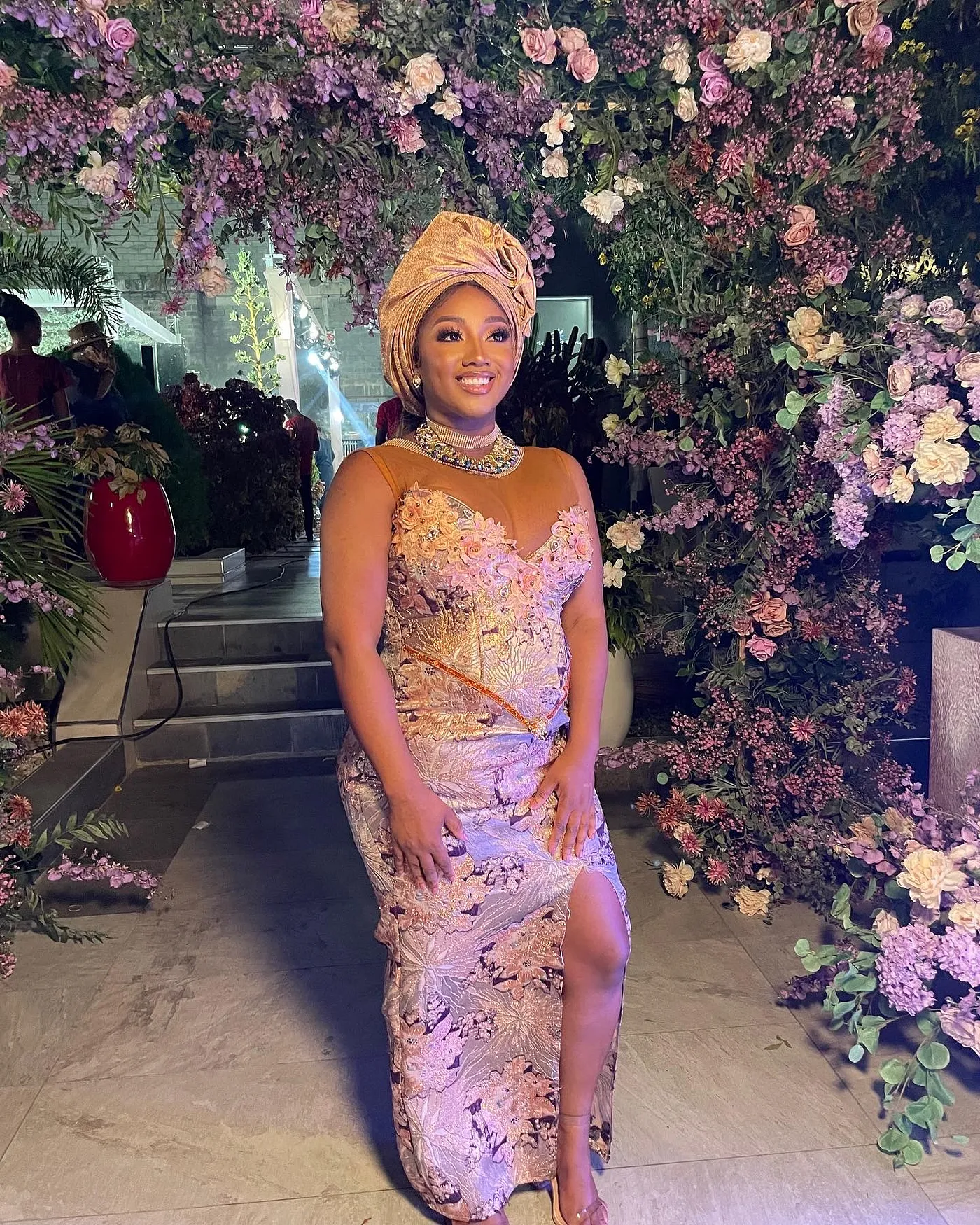
No different from other cultural weddings, Nigerian nuptials can be quite costly, with expenses ranging from the Asoebi fabrics, venue rentals, catering, entertainment, flight and travel. It is not uncommon for couples and their families to invest significant amounts of money in these celebrations, but it is also seen as an investment in the couple’s future, an ode to their heritage and a demonstration of status.
Weddings and the industry of love is considered by far one of the strongest contributors to Nigeria’s GDP. It accounts for the introduction of entire industries that were previously unprofitable, such as makeup artists and luxury toilet hire companies. According to market research group, TNS Global, to be wed in Africa’s most populous country is big business and said to be worth millions of dollars, with costs ranging from 10 million naira ($22,224 USD) at one end of the spectrum to 25 million naira ($55,478.60 USD) with guest lists matching the supersized budgets. It’s not unusual to see a wedding attract more than 1000 guests.
There are quite a few ceremonies and special activities that took place leading up to and during the wedding ceremony, many of which as a diaspora Black person, I felt oblivious to and truly lacked awareness around. These customs were not passed down through family traditions and unfortunately died with my ancestors during the Middle Passage journey. For example, for my friends, there was an “introduction” where the groom visited the bride’s family and informed them of his intentions to marry their daughter and his wish to bring his family to see them. On the agreed date, both families met for the first time at the bride’s home and the bride’s family welcomed and presented the groom’s family with kola nut (the officially Igbo welcome gesture).
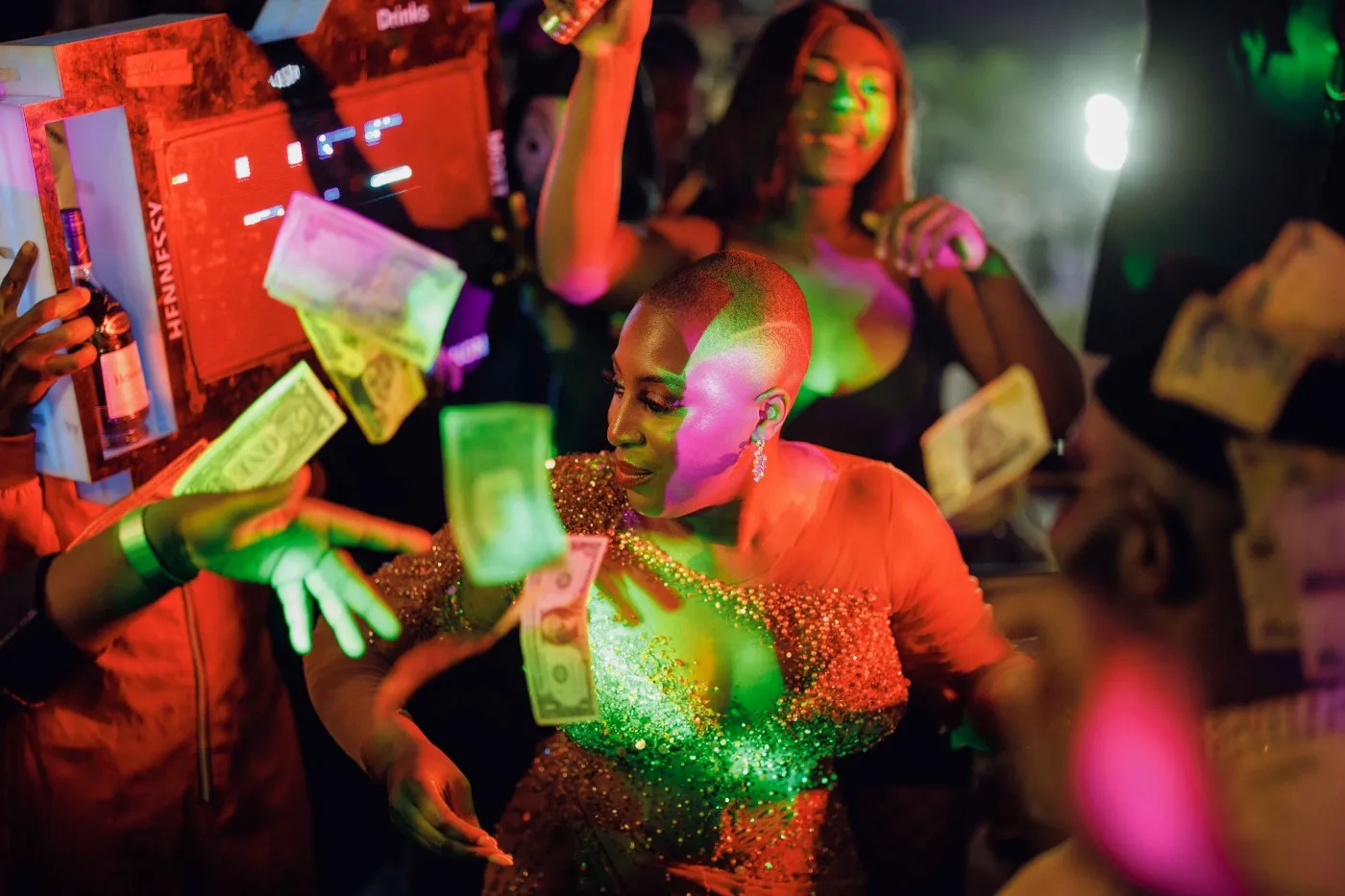
Another tradition in most Nigerian tribes is for the groom to tender a payment for the “bride price.” Done to compensate the bride’s family for the loss of “income or labor” being extracted from the family by marrying a woman and removing her from the household, the bride price does not indicate that a woman is being sold, but is a symbolic gesture to prove that the man is capable of taking care of her and their new family financially.
Also in my journey of cultural discovery during this wedding, I learned that in Nigeria, there are over 500 ethnic groups, and particular fabrics have traditionally been associated with many of them. “Asoebi” itself is a Yoruba word that directly translates to “family cloth” or “family uniform.”
Often seen as a token of appreciation from the bride and groom, the Asoebi also serves as a display of economic power and prestige, as in order to take part in this unique part of the wedding, one must be prepared to have no cost spared. The bride and groom were very thoughtful and intentional about their selection of their Asoebi members, as we witnessed the likes of professionals ranging from doctors, lawyers, entrepreneurs, athletes, entertainers and artists as part of this chosen group. Being handpicked by the bride and groom to join in as an Asoebi guest was an honor and a privilege.
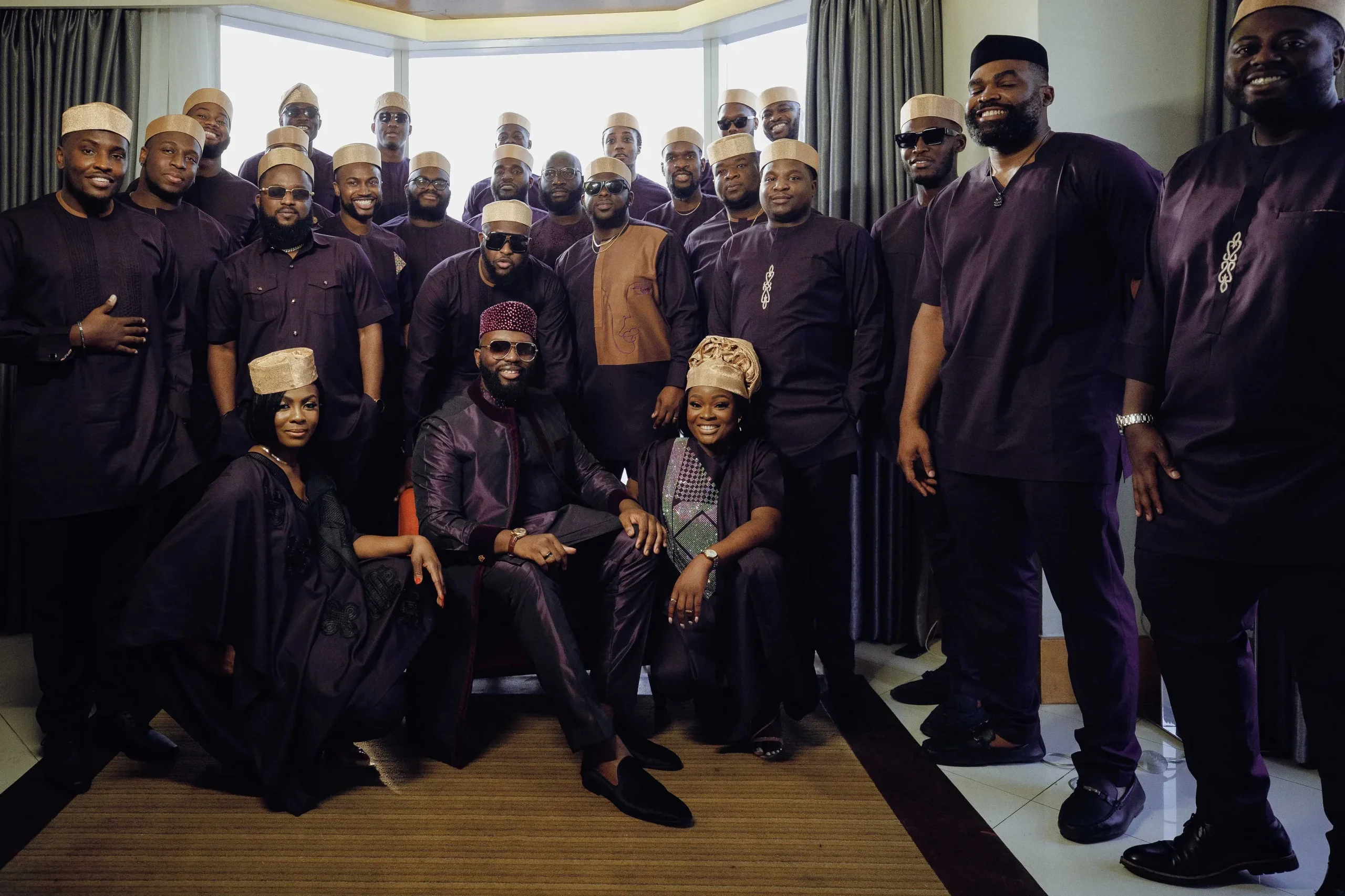
The bride and groom mailed us four to six yards of fabric for our dresses and suits, and another length of fabric for the traditional head wrap, the gele. I was amazed at the level of coordination and effort that went into the Asoebi process and realized at the end how much, in spite of the multitude of shades of melanin, our geographical differences and diverse professional backgrounds, this group effort brought us all closer together. Similarly amongst the groom’s side of the wedding party, the gentlemen looked sharp in their attire and their looks were curated to perfectly complement our sections.
This struggle of identity and belonging is a common one for many individuals of the African diaspora, especially those who have been separated from their ancestral roots due to the transatlantic slave trade and the ongoing legacy of colonialism. The constant battle of resisting the erasure of our history and culture can be a challenging and emotional journey. This is why for me, witnessing activities such as the palm wine ceremony, where the bride walks around stylishly with a traditionally crafted Calabash cup filled with palm wine in search of her groom or the “spraying,” the act of showering the couple with money, were divine reminders that I was in the right place at the right time.
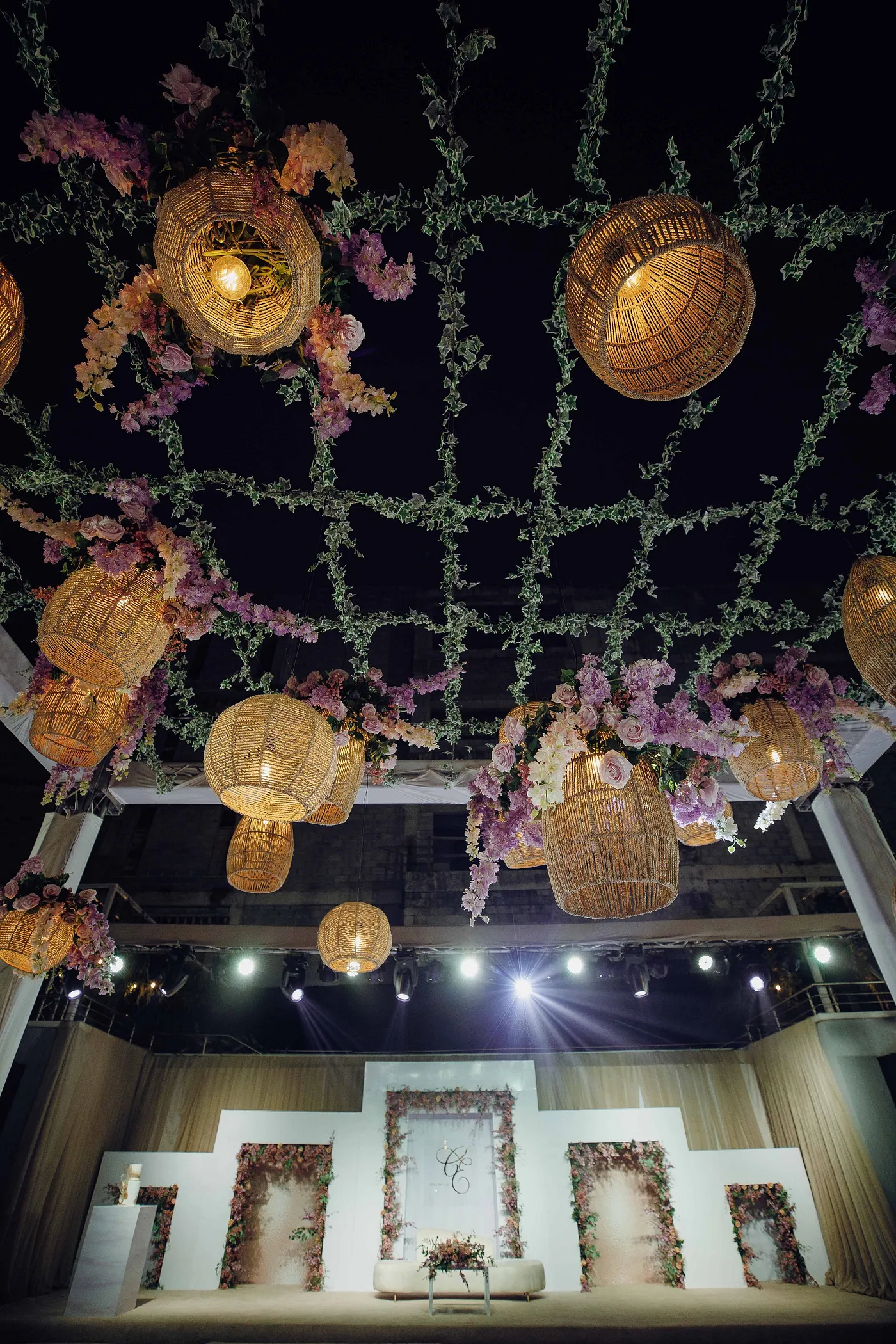
Throughout the evening, there were subtle reminders that we are not alone in this struggle and that there is strength in community and connection; these weddings represent not just luxury but also legacy. Embracing our cultural heritage and connecting with others who share similar experiences can help us feel grounded and bring a sense of belonging. This space allowed us to celebrate the unique aspects of our individual experiences and identities, as well as the resilience and strength that has been passed down to us through generations. The rich symbolism in this speaks to the infamous Igbo saying, “Onye nwere mmadụ ka onye nwere ego,” which means a person with a robust network of people is stronger than an individual with only money.
Being a part of a Nigerian wedding as a Jamaican woman was not only profound, but it was also an out-of-body experience. As people of the diaspora, we navigate the world with this skin. We dominate in sports, in entertainment, we excel in medicine, education and innovation, but still inside there is a void that is palpable. At this wedding, I was able to connect with my roots and feel like I belonged. I felt enmeshed in the vibrant culture and rich traditions, which gave me a sense of being interconnected with my African heritage.
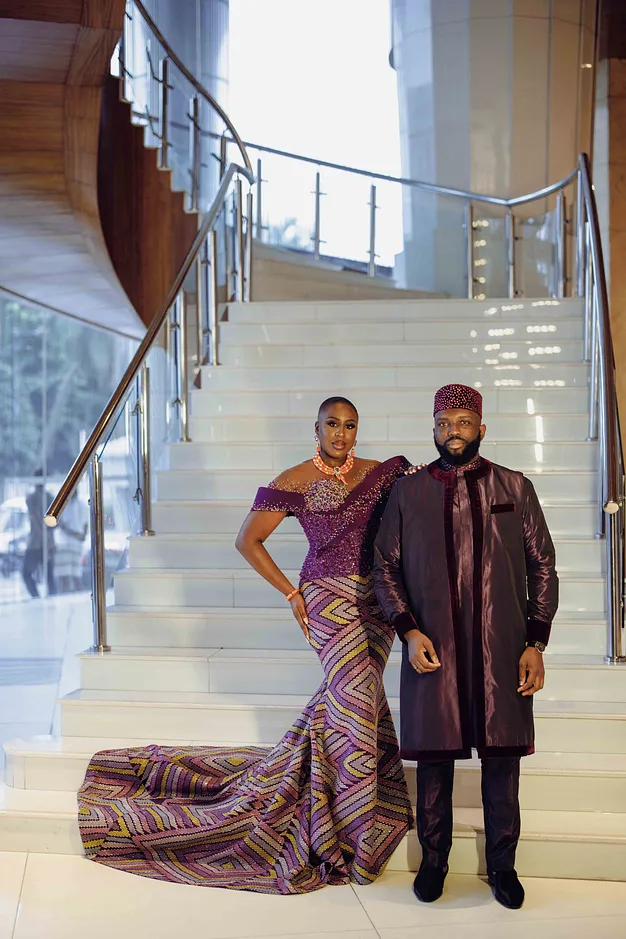
The experience allowed me to reclaim a piece of my lost heritage and relish in all the love, unity, and cultural richness that it represented. It was a reminder that despite the distance and time that separated us, as Black people, we are all connected by a common thread that is deeper than skin tones. It’s in our bones, it’s in our blood. It is our shared cultural heritage, our love of each other in both the romantic and village sense. Our love of our people is our legacy.
As I stood among at least 50 other women from all over the world who had been chosen to be a part of the Asoebi, joined by more than 700 wedding guests, I couldn’t help but feel grateful for the opportunity to be a part of such a beautiful and memorable occasion. It was incredible to feel all of these emotions in such an extravagant showcase of luxury, pageantry and Black opulence.





